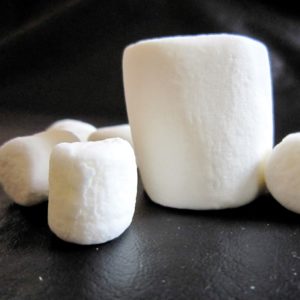Sidetracking is a railroad term. As needed, a train can be moved off of the main track by flipping a switch. It is then put on a track to the side of the main line. Putting a train or a series of train cars on an auxiliary track (a siding) is sidetracking.
In human terms, sidetracking is switching your attention onto an auxiliary target. You use sidetracking by distracting a toddler from destroying your favorite vase. You use sidetracking when you dangle your keys in front of a crying infant. “Oh, look over here.”
 Marshmallows
Marshmallows
In the 1960s, Walter Mischel did his famous marshmallow study with young children. The question whether or not three-year-olds could delay gratification long enough to earn a second marshmallow. Most of the little ones could wait. As children got older, they displayed several clever techniques for handling this problem.
Some would sit on their hands. We’ll return to them when we get to incompatible responses. Some would turn their backs to the table, walk around or sing songs to themselves. They would distract themselves until the time limit was up. These are examples of sidetracking.
Go On Vacation
Some people go on vacation to get over a breakup, finding the change of scenery easier to avoid reminders. This is the “I’m not home, so I don’t have to think about you” approach.
A less drastic alternative is to eat at different restaurants, shop in different stores, or attend different social events. You don’t face the same circumstances. You sidetrack.
Rehab is ultimately sidetracking.
 You take yourself out of your normal environment so you can get sober. By being away from your normal routine, you avoid the locations you usually visit, the friends who lead you astray and the environmental cues that trigger your addictive behavior.
You take yourself out of your normal environment so you can get sober. By being away from your normal routine, you avoid the locations you usually visit, the friends who lead you astray and the environmental cues that trigger your addictive behavior.
One of the reasons short-term rehab isn’t effective is that you’re not away from your normal life long enough to develop new habits. Rehab works best when you are gone for weeks, not hours.
The problem with sidetracking is that eventually you have to get back on the main track. You have to continue on with normal life. You can only avoid for a limited time. It is good to take a break but sidetracking has limited effectiveness.
If you are afraid of the water, staying away from the pool, the lake and the ocean stops the fear from appearing but doesn’t actually break it. Sidetracking distracts you but doesn’t actually break a habit.
Should I Sidetrack?
Perhaps. Sidetracking can help if you use the time wisely,
Once you are sidetracked, you can look for the initial cues that trigger your habit. You identify the triggers and avoid them.
Addicts find that they have to stay away from their old haunts and their old friends. You can fight against the cues in a bar but it is better to not go in the bar. Staying away is a good idea.
Sidetracking temporarily breaks up the internal associations, and gives you time to learn more effective techniques.
Applying It To Real Life
Less Sugar
Many people use sidetracking to change their diet. They simply don’t have any junk food in the house. My nephew refuses to have peanut butter in the house because he would eat it all.
Sidetracking is only a step in the right direction. It doesn’t help you when you eat out or visit other homes. You’ll need other skills.
Car Crash
Typically, sidetracking is the first thing we do when we have intrusive thoughts. We try to distract ourselves. But not thinking about something is challenging. And trying to not think about something leads to rebound.
We are always thinking, so getting rid of one idea is hard. We can distract ourselves for a bit but the idea will return. Also, the more you try not to think of a yellow zebra, the more you think about it. Eventually, yellow zebras are all you can think of.
Sidetracking is not going to help us with our thought control experiment.
Not Multitasking
Distracting yourself form multitasking? I don’t think so. You’re already distracted.
Elevator Fear
Sidetracking doesn’t work with phobias, either. You can’t distract yourself from fear.
Play Along
Look at your list of three habits you want to change. See if you can give yourself a break. It would be great to focus on only one of them.
Can you sidetrack yourself from one or two of them?
What exactly will you do to distract yourself?

